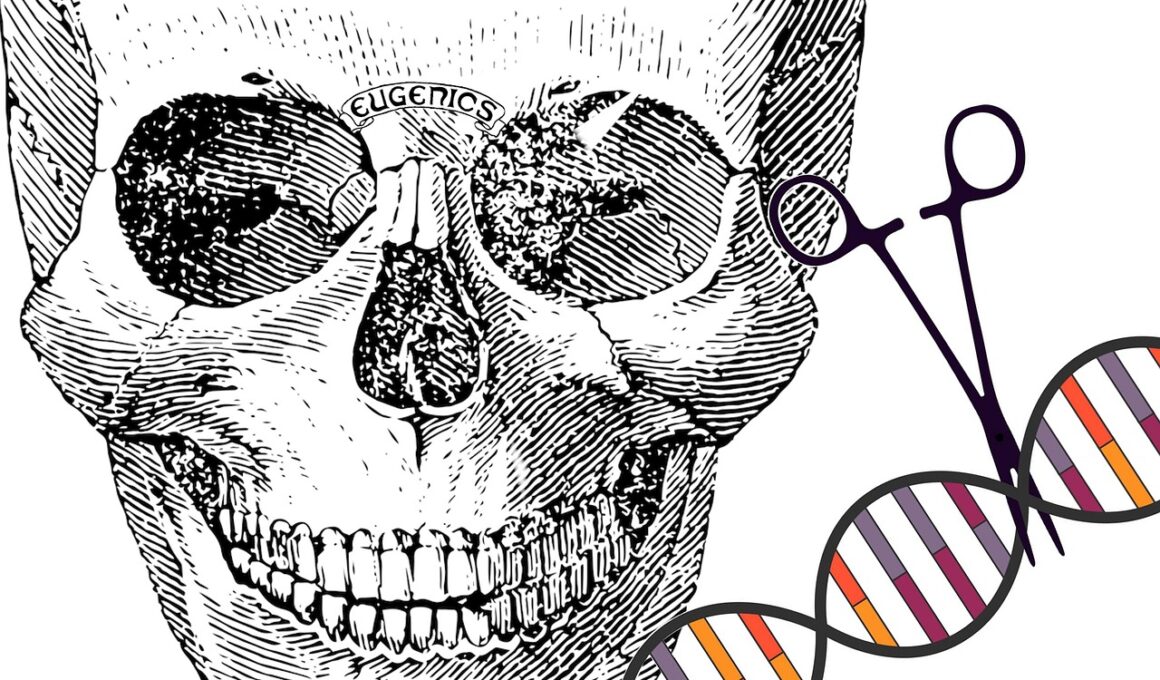Influence of Genetics on Exercise Metabolism
Understanding how genetics influences exercise metabolism is vital for optimizing athletic performance and overall health. Genetics plays a critical role in how our bodies respond to exercise, including aspects like energy expenditure, muscle growth, and endurance. Individual variations in metabolic rate and substrate utilization can significantly impact athletic outcomes. Genetic predispositions can dictate how efficiently our body utilizes carbohydrates and fats during different types of exercise. Certain genes are known to influence these metabolic pathways, leading to better performance in some individuals over others. This variability poses a question: should training regimens be tailored according to genetic makeup? Research suggests that specific genetic markers can provide insights into programming tailored training and nutrition plans. Moreover, advancements in personalized medicine facilitate a deeper understanding of these genetic influences, leading to more effective exercise regimens. For athletes and fitness enthusiasts, understanding genetic predispositions can be empowering. By leveraging genetic information, individuals can maximize their potential, aligning their workouts and dietary approaches to suit their unique metabolic profiles. Recognizing these genetic factors helps athletes not only enhance their performance but also aids in injury prevention and recovery efforts.
Exercise metabolism encompasses the biochemical processes that occur when the body engages in physical activity. These processes are essential to achieve desired results from training, and they vary remarkably among individuals, largely due to genetic factors. The metabolic response to exercise can be affected by muscle fiber types, aerobic and anaerobic capacities, and nutrient utilization rates. For instance, individuals with a higher proportion of fast-twitch muscle fibers may excel in short, high-intensity activities, whereas those with more slow-twitch fibers could perform better in endurance sports. Variations in hormone levels, such as insulin and cortisol, also significantly contribute to metabolic differences. Furthermore, mitochondrial efficiency plays a central role in aerobic metabolism and can influence an athlete’s endurance levels. Studies have shown that genetic variations in mitochondrial biogenesis can affect how effectively an individual processes oxygen during prolonged workouts. This genetic predisposition could mean the difference between a casual jogger and a professional marathon runner. Enhancing our understanding of these genetic influences could revolutionize training and recovery strategies in sports, with profound implications for the future of exercise science.
Another critical component of exercise metabolism influenced by genetics is the recovery process. Recovery is essential for any training regimen, affecting performance and progress in athletes. Genetic differences affect muscle repair rates, inflammation responses, and the ability to recover after intense workouts. Post-exercise recovery relies on glycogen replenishment, protein synthesis, and the modulation of the inflammatory response. Some individuals may have genetic variants that allow for a quicker replenishing of glycogen stores, leading to faster recovery times. In contrast, others may experience prolonged muscle soreness due to inflammatory responses mediated by their genetic setups. Moreover, the presence of certain genetic markers can indicate how well an individual might recover physiologically from intense workouts, signaling when to increase or decrease training intensity. Adapting training programs based on one’s capacity for recovery can maximize performance benefits while minimizing the risk of overtraining. Ultimately, understanding genetic influences on recovery will enable athletes to refine their training protocols, leading to enhanced performance outcomes and reduced injury risk. This knowledge could be the key to long-term success in competitive sports.
Genetic Variations in Metabolic Pathways
Genetic variations play a pivotal role in determining an individual’s metabolic pathways during exercise. The impact of these variations extends to how the body utilizes energy substrates like fats and carbohydrates. For instance, certain polymorphisms in genes such as PPARGC1A or ACE are associated with varying capacities for endurance versus strength training. These genetic markers can help predict whether an individual will respond better to endurance training compared to resistance workouts. Consequently, understanding one’s genetic makeup can help athletes tailor their training regimens accordingly. Genetic testing can unveil critical insights into which exercises may yield optimal results based on an individual’s unique genetic predisposition. Beyond performance, these factors can inform dietary strategies, as some might benefit from higher carbohydrate intake while others excel with a higher protein or fat diet. This targeted approach not only streamlines training but can enhance overall health and well-being by aligning exercise and nutrition practices with individual genetic profiles. This growing field of research is set to unlock more personalized fitness programs in the future.
Notably, the impact of the environment cannot be underestimated in exercise metabolism. Genetic predispositions often interact with environmental factors such as diet, exercise type, and lifestyle to shape athletic performance. Nutrition plays a vital role in realizing the potential dictated by genetics. For example, an individual with genetic markers indicating a propensity for endurance may not perform optimally without a proper high-carbohydrate diet to support their metabolic needs. Similarly, training modality also influences how genetic factors manifest during exercise. Adaptive responses to training require a synergy of genetic potential and environmental stimuli for optimal outcomes. For instance, two athletes may possess similar genetic profiles but achieve different performance results due to varying training approaches and nutritional habits. Therefore, an integrative approach combining both genetic insights and environmental considerations will ensure comprehensive fitness optimization. Looking forward, this dual focus on genetic and environmental factors will be crucial for developing individualized training interventions, ultimately making exercise more effective and enjoyable.
The Role of Research in Exercise Genetics
Ongoing research into the genetic basis of exercise metabolism is critical for advancing our understanding of sports science. Scientific studies have already identified numerous genes associated with metabolic characteristics like VO2 max, lactate threshold, and fat oxidation rates. By continuing to explore these connections, researchers aim to provide deeper insights into how specific genetic traits contribute to exercise performance. Recent advances in genomics and biotechnology are paving the way for groundbreaking discoveries in the field. They allow for more detailed examinations of how various genes interact and function during exercise. For example, utilizing genome-wide association studies (GWAS) can reveal crucial links between genetic variants and performance metrics. Furthermore, research findings are increasingly being translated into practical applications for athletes, enabling more precise training guidelines and dietary recommendations based on genetic profiles. This knowledge could ultimately shift how athletes prepare for competitions and pursue enhancements in their performance, offering a more individualized approach that harnesses genetic insights for improved outcomes.
Finally, the ethical considerations surrounding genetic testing and exercise metabolism must be addressed. As genetic testing becomes more accessible, the potential misuse or misinterpretation of results raises concerns. The predictive nature of genetic information could lead to issues such as discrimination in sports or unrealistic performance expectations among athletes. Ensuring that individuals approach genetic testing with a clear understanding of its implications is essential. Furthermore, there should be guidelines in place that promote responsible use of genetic data specifically in sports. Educating athletes, coaches, and sports organizations on the benefits and limitations of genetic testing will help establish best practices. Equally important, promoting inclusivity and fair play must remain paramount in competitive fields. The coming years will likely see regulatory frameworks aimed at managing genetic testing in sports, ultimately shaping its future in exercise science. Taking a balanced view can contribute to more ethical practices while leveraging the potential benefits of genetic insights in enhancing sporting performance.
This section highlights the future possibilities of understanding the influence of genetics on exercise metabolism. As research continues to uncover the complexity of genetic interactions, athletes, coaches, and fitness professionals will be better equipped to harness this knowledge. The integration of genetic insights into training and nutrition will likely lead to more effective programs tailored specifically to individual needs. Moreover, as technology advances, accessing genetic testing will become more affordable and widespread, democratizing this information for all. Personalized approaches will not only enhance athletic performance but also promote healthier lifestyles for the general population. Individual variation in exercise responses will be recognized as a valuable aspect of fitness, rather than an obstacle. Emphasizing genetic diversity acknowledges the richness of human biology and its influence on health and fitness. This evolving understanding can inspire greater engagement in exercise across ages and fitness levels. By appreciating our unique genetic makeups, we can promote a culture that celebrates individual pathways to health and performance. An inclusive approach will empower everyone to find their best way of exercising, achieving personal goals while fostering community. The future of exercise science is bright, paved with genetic knowledge that transforms athletic pursuits and wellness practices.


